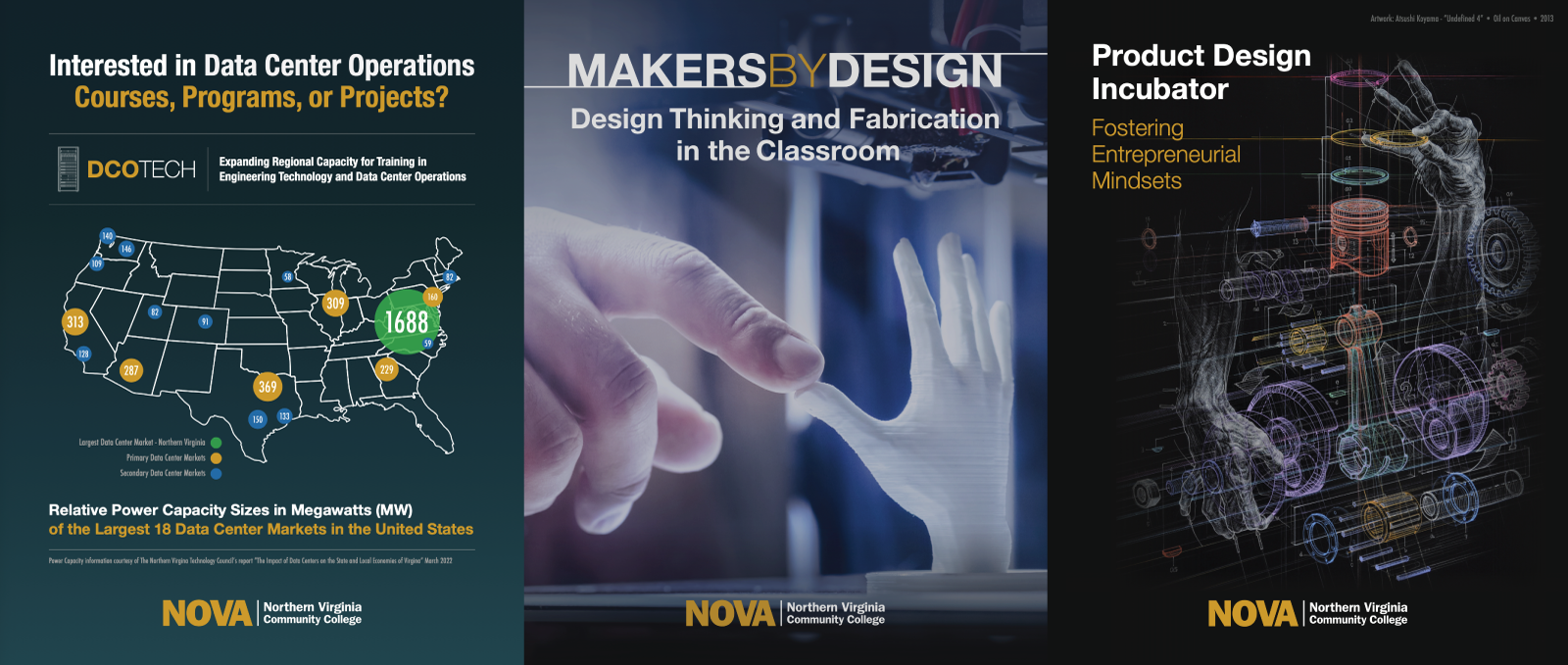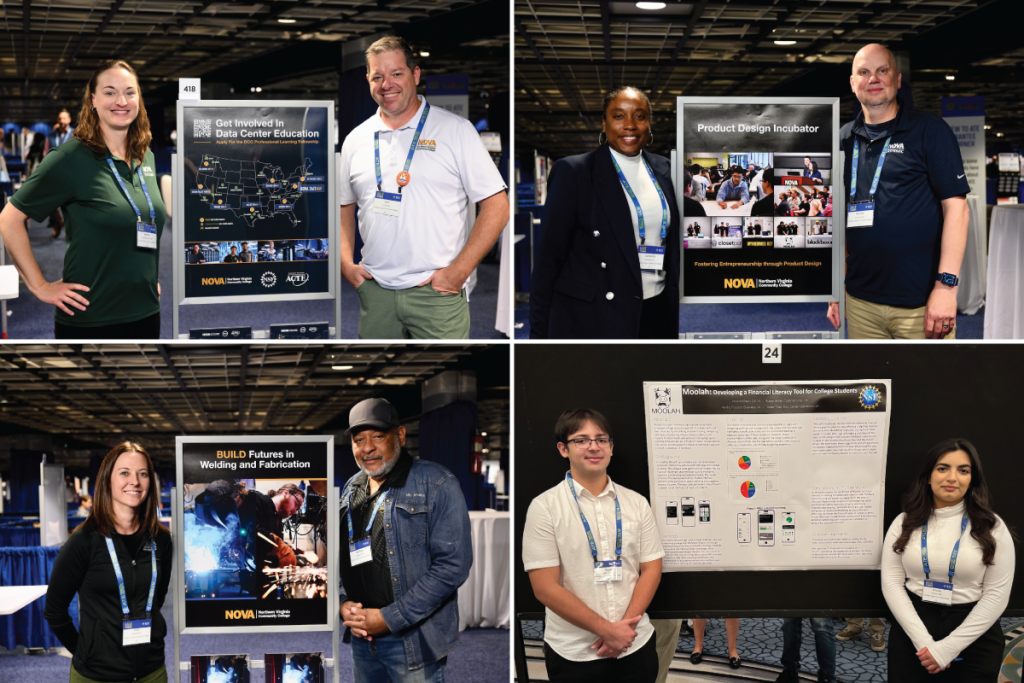
In Washington D.C. from Oct 26-28, five NOVA PI’s (principal investigators), leading three National Science Foundation (NSF) Advanced Technological Education (ATE) projects attended the 2022 NSF ATE PI Conference to network with community college PIs and program officers at the annual conference. The NOVA PIs highlighted their project successes and collaborated with colleagues from around the country to advance the education of technicians for the high-technology fields that drive the nation’s economy.
The conference brought together more than 600 NSF ATE grantees and their project partners to focus on the critical issues related to advanced technological education. Conference participants represent community colleges, business and industry, secondary school systems, and four-year colleges in a wide variety of areas, such as information technology, engineering technology, micro- and nanotechnologies, chemical technology, biotechnology, and more.
>> Article on Benefits of ATE Grants
Because of grant-based programs and activities, NOVA students have more access to in-demand, high-paying STEM careers, and NOVA faculty and staff are provided the tools to increase awareness and opportunities for these important fields of study.
NOVA’s NSF ATE Projects:
DCO Tech: Expanding Regional Capacity for Training in Engineering Technology and Data Center Operations.
PI: Josh Labrie | Co-PIs: Amir Mehmood & TJ Ciccone
At the ATE conference, Josh Labrie, Director of NOVA SySTEMic, and TJ Ciccone, DCO Adjunct Faculty and VP of Critical Infrastructure at STACK Infrastructure, highlighted the NSF ATE project DCO Tech. This project is designed to increase regional capacity for training in Engineering Technology (ET) and Data Center Operations (DCO) through expanded recruitment, employment training, and increased collaboration between industry, K-12 educators, and faculty. At the conference the team highlighted the successes of the Summer Bridge Program and the Secondary Externship. In addition, Ciccone lead a presentation on DCO: Building Awareness and Opportunity for an Emerging Field.
In 2022, NOVA’s Summer Bridge Program for Engineering Technology saw 20 high school students (14 rising seniors and 6 graduates) complete the 2-week summer enrichment program which provided them with 1-credit in SDV. Students participated in industry tours of Micron Technology and STACK Infrastructure, a local data center, to learn about the career opportunities and pathways in engineering technology. Additionally, students experienced NOVA through campus tours and NOVA student offices presentations, and 14 earned an OSHA 10 industry certification. NOVA included transportation between campuses, field trips to industry partners, and an ice cream social to cap off the program.
In addition, 18 educators completed the Secondary Externship for school CTE administrators, teachers, and counselors to raise awareness for engineering technology and DCO careers. NOVA’s Secondary Externship program equips educators with knowledge about ET and DCO careers and the educational pathways NOVA provides to prepare students for the technology workforce. Externship educators attended tours of Micron and STACK Infrastructure, as well as a professional development day at the NOVA Fab Lab. The goal is to create clear pathways and provide materials to illuminate NOVA’s ET and DCO programs and the careers they lead to.
After the conference, Labrie was ebullient about the importance of Data Center Operations and the players behind its growth: “NOVA has exceptional faculty members like TJ Ciccone whose combination of industry experience and passion for education benefit our students and the grant funded work we do. At the NSF ATE PI conference, TJ and I were able to share NOVA’s DCO program with faculty from around the country. My hope is that NOVA’s successful program can serve as a model for other colleges to engage in DCO education, and that this work will raise awareness for data center education and career opportunities.”
Bridge programs and Externships continue in spring/summer 2023. Students and educators can sign up now to receive notification when applications are available at info.novastem.us/SummerPrograms
Makers By Design: Supporting Instructors to Embed Design Thinking in Digital Fabrication Courses.
PI: Josh Labrie | Co-PIs: Hamadi Belghith & Richard Sewell
Makers By Design (MBD) strengthens engineering technology pathways by providing professional learning for postsecondary faculty and K-12 educators and seeks to create a community of practice among engineering educators involved in community-based makerspaces at public libraries, private organizations, public school systems, colleges, and universities.
MBD Grant Project Manager Chris Russell represented MBD at the conference and highlighted the Design Thinking Fellowship to attendees.
The Fellowship, funded by MBD, is comprised of middle and high school teachers, informal STEM learning professionals, and college faculty. The fellowship comes with a stipend and involves completing a 5-day Professional Learning (PL) Institute at the NOVA Fab Lab in Spring 2023, teaching PL topics at a 1-week summer camp and creating and implementing PL classroom activities.
In 2022, the design thinking cohort of 17 fellows participated in five professional learning workshops and provided 116 middle and high school youth a digital fabrication summer camp at NOVA and the Boys and Girls Clubs of Greater Washington. The cohort will complete the fellowship by creating a design challenge and contributing a lesson plan to the project for design thinking.
Next spring we will host a second cohort of Design Thinking Fellowship educators. Recruitment will begin in November and there will be interest meetings on Wednesday November 9th and also on Tuesday December 6th. You can sign up for these sessions at fellowship.novastem.us/MBDinfo. If you are already familiar with the fellowship and ready to apply you can do so at fellowship.novastem.us/MBDapply
On the ATE conference, Russell reflected: “increasing alignment between industry needs and classroom instruction is a pressing concern in rapidly advancing technological fields. Through the thoughtful feedback from our ATE colleagues, we will improve our teacher preparation to better serve employers and students in the region.”
Product Design Incubator (PDI): Fostering Entrepreneurial Mindset Through Interdisciplinary Product Design
PI: Richard Sewell | Co-PIs: Cameisha Chin & Paula Ford
Richard Sewell, NOVA’s Fab Lab Manager, was at the conference and observed: “the ATE Conference was an excellent opportunity to engage with fellow technology educators to compare our approaches, learn new methods, and share our findings in a constantly changing tech arena. By the end of the conference, it became clear that NOVA’s NSF ATE programs are tackling head-on the most pressing issues shared throughout the nation’s top academies.”
Sewell is the PI on the NSF Product Design Incubator (PDI) Grant. PDI is a new project designed to train community college students through a product design challenge that aims to combine technical knowledge with soft skills and interpersonal development. Each year, PDI participants will:
- Learn entrepreneurship skills during 6 spring workshops.
- Design and protype a product during a summer product design incubator.
- Pitch a product to regional entrepreneurs
- Receive a $3000 stipend for completion
Essentially, PDI will increase contact between students and industry professionals, foster interdisciplinary collaboration between NOVA students and staff, and increase the supply of IET workers with industry required collaboration, communication, and critical-thinking skills.
You can complete a apply PDI application at fablab.novastem.us/PDIapply
Interest meetings will be held on Thursday, November 10 and Thursday, December 8. You can register for those at fablab.novastem.us/PDIinfo
To learn more about our Grants in general visit www.nvcc.edu/academics/divisions/it/sponsored-grants.html











